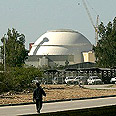
Iranian nuclear reactor
Photo: AFP
Iran, set to reply on Tuesday to an offer by world powers aimed at defusing a nuclear standoff, has insisted it would not stop enriching uranium as they demand by an Aug. 31 deadline to avoid possible sanctions.
Refusing to suspend the work, which Iran says is aimed only at generating electricity but which the West sees as a disguised bid for atom bombs, would be tantamount to rejecting the package of incentives offered in return, Western diplomats say.
Islamic Republic
Pensioner Affairs Minister Rafi Eitan calls on home front to prepare bomb shelters, protected rooms ahead of possible attack by Islamic Republic
But a rebuff would not yet trigger immediate action by the UN Security Council, which passed a resolution on July 31 giving Iran a month to halt enrichment or risk sanctions.
“We are not treating (Tuesday) as a deadline because it is not the Security Council deadline,” one Western diplomat said. “If Iran flatly refuses to suspend enrichment, then there will, fairly soon, be more talks in the Security Council.”
Ali Larijani, chief nuclear negotiator, will hand Iran’s written response to foreign ambassadors in Tehran at 3:30 at the Supreme National Security Council, which handles the nuclear file, a senior Iranian nuclear official said.
Tensions rose further as diplomats close to the UN Nuclear watchdog said its inspectors were denied access to an underground site under construction where Iran plans industrial- scale production of enriched uranium.
A senior diplomat said blocking inspectors this way could be a violation of the nuclear Non-Proliferation Treaty since the UN Inspectors have a right to verify design information during the construction of a nuclear facility.
Iran denied hindering access to the Natanz installation for an International Atomic Energy Agency team visiting to gather information for an Aug. 31 report to the Security Council.
The United States, France, Britain, Germany, China and Russia offered a package of economic and other incentives in June, aiming to persuade the Islamic Republic to stop work that the West says is helping build nuclear warheads.
Iran, which has denounced the deadline as illegal and worthless, said it would reply by the end of the Iranian month of Mordad, Aug. 22.
'Russia and China might take a different view'
The world’s fourth largest oil exporter insists it will not abandon what it calls its right to enrich uranium for use in nuclear power stations.
The response will be handed to all six countries, with the Swiss ambassador taking a copy for the United States which has had no representation in Tehran since after the 1979 revolution.
Supreme Leader Ayatollah Ali Khamenei, who has the final word in Iran, vowed on Monday that Iran would not be deflected from its pursuit of nuclear energy. President Mahmoud Ahmadinejad has also been a vociferous opponent of compromise.
Other Iranian officials have stated plainly that Iran will not stop enrichment.
Iran has said its reply will be “Multi-dimensional”, suggesting no simple ‘yes’ or ‘no.’ Officials have also said Iran wants more talks to resolve the dispute.
Such an approach, say diplomats, could lay bare divisions in the Security Council where the United States, France and Britain back sanctions but Russia and China, the other two veto-wielding members and both key trade partners of Iran, oppose them.
“If they reject suspension, that’s rejection of the package (for Western capitals),” said another Western diplomat. He added that Russia and China might take a different view.
“If they said suspension was negotiable, there would be pressure on (the six powers) to think about it.”
Analysts say Iran is probably calculating that any move towards sanctions would start with modest steps, such as travel bans on officials or asset freezes, which it could tolerate because the country’s coffers are brimming with petrodollars.
US President George W. Bush said on Monday the international community should “Work in concert” Over Iran. Washington has previously warned of swift UN Action if Iran fails to meet UN Demands.
United States says it wants a diplomatic solution to the standoff but has refused to rule out military action.















